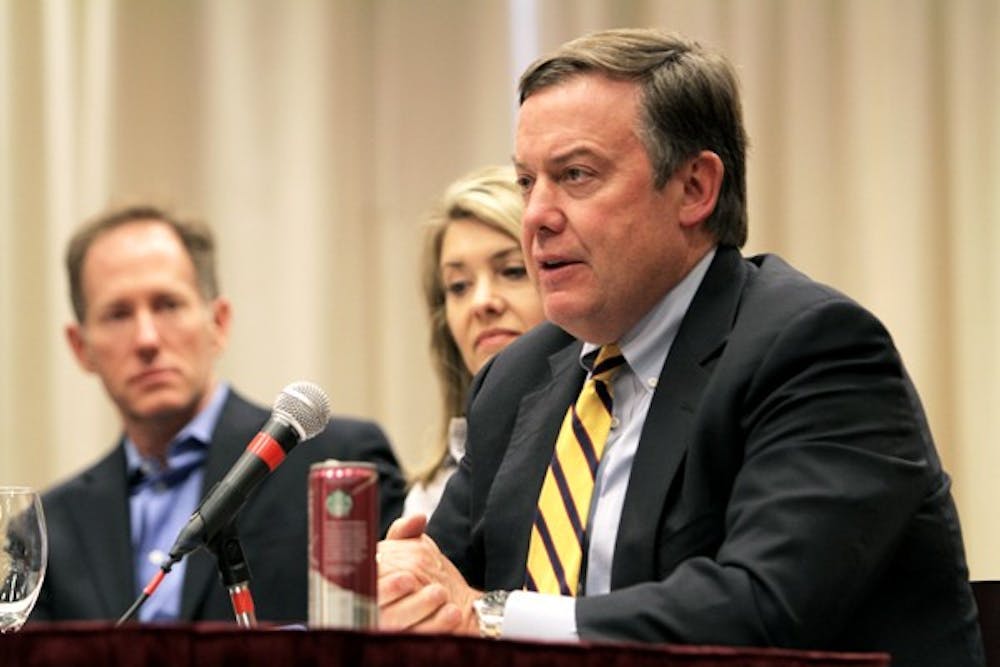For the first time the executive candidates of all five ASU student governments debated topics ranging from campus safety to tuition increases at one time.
Wayne Unger, elections commissioner for the Associated Students of ASU, moderated the debate and said it was part of an effort to encourage coordination between all five student governments at ASU.
“We decided to do the (debate) to promote the mission that we need to be one University on multiple campuses,” he said. “University students must work together as a whole.”
Each candidate teleconferenced into the debate from their campuses.
Undergraduate Student Government Downtown:
Journalism freshman Travis Arbon and general studies major Frank Smith III, both sitting USGD senators, are running for the presidential seat.Arbon promised a greater interaction between USGD members and students on the Downtown campus. He also declared his ticket’s support for Gov. Jan Brewer’s recently proposed budget plan, saying it would free up millions of dollars in state funds, which could go to ASU.
“Part of the budget proposal gives money to the UA downtown campus, but we want the money to come to all universities in the greater Phoenix area, including ASU,” he said.
Arbon’s ticket also promised to improve public transit safety, because he said the Downtown campus is the commuter campus.
Smith said the Downtown campus loses between 9,000 and 10,000 students who move to other campuses each year. He said USGD needs to give these students incentive to stay by encouraging the growth of Greek life on the Downtown campus and partnering with UPS to make student move-ins more efficient.
Smith said he was involved in campaigning for legislation that would allow foster students to receive free education. The bill is awaiting approval from the state House of Representatives.
“We are already advocating for students and will continue to do that in the presidency,” Smith said.
Graduate and Professional Students Association:
Criminal justice graduate student Sergio Favela and organizational communications graduate student Megan Fisk differed on how to best fund education.Fisk advocated for new methods of raising money to support grants offered to graduate students and said she supports a proposed 3 percent tuition increase, because quality teachers are crucial to a good education.
“I realize how difficult it is to get tuition,” Fisk said. “But it’s so important that we have the best teachers, and to have the best teachers we need to have an increased rate of teachers.”
Fisk is the vice president of professional development for GPSA and manages a travel grant program available to ASU graduate students.
Favela promised to utilize GPSA's resources to make grants more accessible to all graduate students and opposed the tuition increase.
“Although we do have good teachers, we should be able to provide more money for graduate students and not just loans,” she said. “Most of them are struggling.”
Favela criticized Fisk for only focusing on students who are currently recipients of grants.
“She forgot the other students like me,” Favela said. “I want to bring all graduates together and make sure all graduate students are included.”
Undergraduate Student Government Polytechnic:
Operations management and technology junior Franz Ferguson is running unopposed for the USGP presidency. Ferguson said it is important to be open to students who have suggestions for ways to improve the student experience at the Polytechnic campus and advocate for greater transparency in the use of student funds.“Why do students have to pay so much money? We want to find that answer,” he said.
Tempe Undergraduate Student Government:
Tempe's race is the most contested, with political science sophomore Jordan Davis, business junior Kyle Matson and political science and Russian junior Natasha Yenina all running for president.Davis's ticket promised to deliver realistic and attainable goals, including improving student seating at football games and establishing a dedicated bike route to avoid campus bike accidents.
“What we are proposing on our platform is attainable; it can be done,” Davis said. “We know what can be accomplished.”
Matson promised a realistic and grounded presidency that would encourage students to receive tax credit donations from friends and relatives to help pay for textbooks and offer sporting event ticket discounts to student organizations to promote attendance and involvement.
“What defines me as a deserving candidate would be how I see things clearly and see things simply,” Matson said.
Yenina said her ticket would visit every student club and organization and establish a quiz that would help place students in clubs with which they identify.
Yenina said she hopes to implement a Good Samaritan policy that would offer protection to students who may be may be violating the law if they are assisting other students in cases of emergency. She said she wants to expand USG to accommodate these changes.
“We believe that USG needs growth,” Yenina said. “We have the experience necessary to ensure the growth that USG needs.”
Undergraduate Student Government West:
Social and behavioral sciences sophomore Sana Keshap and political science and religious studies sophomore Howard Waldier IV are both seeking the USGP presidency.The Keshap ticket promised to expand pride and spirit efforts beyond sports to accommodate the interests of all students at the West campus and instill greater pride in students at the campus.
“We need to beef up the morale here at West campus,” Keshap said.
Waldier said his ticket will emphasize connectivity between USGW and the student body by returning to previous USGW practices such as broadcasting their meetings lives.
“Our main platform is shaping USGW in the direction it needs to go,” he said. “We have the experience and the originality. That’s what West needs.”
Reach the reporter at jwthrall@asu.edu or follow him on Twitter @jthrall1




